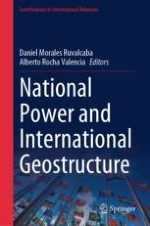2024 | OriginalPaper | Buchkapitel
2. The National–International Power of the States: A Trans-Structural Proposal
verfasst von : Alberto Rocha Valencia, Daniel Morales Ruvalcaba
Erschienen in: National Power and International Geostructure
Verlag: Springer Nature Singapore
Aktivieren Sie unsere intelligente Suche, um passende Fachinhalte oder Patente zu finden.
Wählen Sie Textabschnitte aus um mit Künstlicher Intelligenz passenden Patente zu finden. powered by
Markieren Sie Textabschnitte, um KI-gestützt weitere passende Inhalte zu finden. powered by
